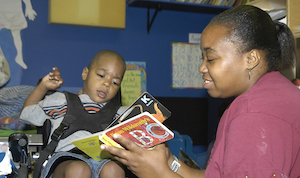
Introduction to the IEP
What Is an IEP?
The Individualized Education Program (IEP) is the document that outlines the special education and related services that your school district will provide for your child at no cost to you. It is developed for children who have been evaluated and are in need of special education. This includes children who are homeless, incarcerated, hospitalized, or in an institution. IEP services will be based on information gathered from evaluations, district assessments, and current levels of achievement on IEP goals and in the general education curriculum. The IEP provides a written record of decisions made at IEP meetings.
Parents Need to Know
According to IDEA, “the term individualized education program or IEP means a written statement for each child with a disability that is developed, reviewed, and revised in a meeting in accordance with” federal and state laws, regulations, and rules.
34 CFR 300.320
How Can Parents Participate in Developing IEPs?

The IEP document is the cornerstone of the special education process and the key to services your child receives. By understanding your child’s IEP and taking an active role in developing it, you can help ensure that your child receives the education and services that they need.
As a parent, you have the right to have information explained to you in understandable language. You know your child’s strengths and needs, and you should discuss them with the rest of the IEP team. It is a good idea for both parents and teachers to have high expectations for your child.
To help develop the goals that will enable your child to become as independent and productive as possible, you may want to ask yourself:
- What do I want for my child?
- What can my child do now?
- What do we need to do so my child will gain new skills?
Together, you, school personnel, and others can discuss, plan, and implement a special education program that serves your child’s needs. There is no blueprint or prescription for an IEP. The IEP team, which includes the parent(s), will develop a program that meets your child’s individual and specific needs. This flexibility is good, but it requires your preparation and participation.
Parents Need to Know
The purpose of special education is “to ensure that all children with disabilities have available to them a free appropriate public education that emphasizes special education and related services designed to meet their unique needs and prepare them for further education, employment, and independent living.” IDEA 1400(d)(1)
When IEPs Must Be in Effect
Initial IEP: When a child has been evaluated and found to be eligible for special education, an IEP must be developed before services can begin. This document is called the initial IEP. The school must make sure that this first IEP meeting is held within 30 calendar days after a child has been found eligible for special education and related services.
Annual IEP: An IEP is written every year for a child receiving special education. This annual IEP may be written any time during a calendar year, but it must be in effect at the beginning of each school year.
IEP Meetings

You have a right to participate as an equal member of your child’s IEP team in all meetings that discuss your child’s identification, evaluation, placement, and the provision of a free appropriate public education (FAPE). The purpose of the IEP meeting is to discuss, develop, revise, and document a program to meet your child’s individual learning needs. Each school is responsible for organizing and conducting IEP meetings. An IEP meeting must be held at least once a year.
Annual discussion topics may include:
- Progress or lack of expected progress toward the special education goals and objectives
- Progress or lack of expected progress in the general education curriculum
- New information from evaluations
- Information provided by the parents or the school
- The child’s anticipated needs
- Other matters
After the IEP meeting, you will receive a Prior Written Notice and a Parental Consent/Objection Form with the IEP. This is your opportunity to agree or disagree with the planned services for your child.
Districts must make sure that special education and related services are available as soon as possible following IEP development and parent consent to the IEP.
Resources
The IEP Team
IEP Form Example Section

Your child’s IEP team must include:
- A parent or the student if age 18 or older
Definition of Parent: A child’s parent or a person acting in that role. Te parent may be the biological or adoptive parent; a long-term foster parent, if parental rights have been terminated; a legal guardian; a person acting in the place of the parent, such as a grandparent; a surrogate parent; or the student age 18 and older. A legal guardian is a person appointed through court procedures. A surrogate parent is a person appointed by the school through special education procedures to represent the child in decisions involving special education services. Parents who do not have legal custody but whose parental rights have not been terminated retain their rights to receive information from the school, participate in program planning, and attend school conferences unless the court determines otherwise.
- A school district representative who is qualified to teach or supervise special education, knows about the general education curriculum, and knows about the resources of the school district
- At least one of your child’s special education teachers who will be responsible for implementing the IEP
- At least one of your child’s regular education teachers if your child participates or may participate in the regular education environment
- A person who is qualified to interpret evaluation results and their educational implications (this person may also have one of the roles mentioned above)
The IEP team will include an IEP manager (also called a case manager) who will coordinate a child’s special education program. This person must be a teacher or licensed related-services staff person and a member of the IEP team. The IEP manager arranges IEP meetings and sends out notices. You can contact the IEP manager if you have questions about your child’s IEP.
Attendance at IEP meetings is required for all of the professionals listed above with two exceptions. A team member may be excused from attendance for whole or part of an IEP meeting if their area of curriculum or related services:
- Is not being modified or discussed, and the parent and school district agree in writing that the member need not attend the meeting
- Is being modified or discussed and the team member provides written input into the development of the IEP prior to the meeting, and the parent and school district agree in writing that the member may be excused from the meeting
Parents Need to Know
Every IEP team member has important information and expertise that affects the team’s ability to make informed, appropriate decisions regarding your child’s special education program. You should carefully consider whether you want to excuse a required member of the team from the meeting.
In some situations, IEP team members also may include:
- People that you or school staff invite because either you or school staff have decided they have expertise or knowledge regarding your child
- The child, whenever the parent thinks it’s appropriate
- The student, whenever transition is discussed (during grade 9 and after, or younger if appropriate); if the transition-age student does not attend the meeting, the school must find other ways to make sure that the student’s desires and interests are considered
- A representative of another agency if that agency is likely to be providing or paying for some services, such as transition services or mental health services
Parents Need to Know
- The school must ensure that the team includes all the required members.
- If a required team member is unable to attend and is not excused by you in writing, you may want to reschedule the meeting.
- The regular education teacher can help decide if your child needs positive behavior interventions, supplementary aids and services, or program modifications in the regular education classroom. They also can help decide if school personnel need support to teach your child.
- The regular education teacher can be a key team member, as they are familiar with grade-level and age-level expectations for all children.
- One of the other team members (but not the child’s special education teacher) may also fill the role of school district representative if they meet the requirements of both roles.
- Including your child at IEP meetings helps the them to learn to self-advocate, and understand their disability and educational needs. Your child will experience a team working together to help them be successful.
- You can invite anyone you believe is knowledgeable or has special expertise about your child, such as a relative, friend, advocate, child care provider, medical professional, or someone knowledgeable about your child’s race, culture, or disability. It is a good idea to inform the school if you are planning to bring someone with you.
- You can request that other school personnel be invited but they will need the permission of the school to attend.
Parent Participation

The school is responsible for making sure that one or both parents are present at each IEP meeting or are given the opportunity to participate. The school must:
- Notify you of the meeting early enough to give you the opportunity to attend
- Schedule the meeting at a time and place mutually agreeable to you and the school
- Use other methods, such as individual or conference phone calls, to help you participate if you cannot attend an IEP meeting
When you are notified of the IEP meeting, you must be informed of:
- The meeting date, time, and location
- The list of people invited
- Your right to invite others
- The purpose of the meeting
If the purpose of the meeting includes the discussion of transition, the meeting notice must state this.
If you cannot attend or participate in the meeting, the school must document how it tried to involve you, whether through telephone calls, written invitations, or visits to your home or workplace.
The school district must take whatever action is necessary to ensure that you understand what happens during the IEP meeting. This responsibility includes providing an interpreter or translator if you use sign language or if your primary language is not English.
Parents Need to Know
- Some IEP meeting notice forms note how much time the school has allowed for this meeting. If your form does not include this information, you may want to ask before the meeting begins so that you can plan your time accordingly. The team may need to add time or reconvene to cover all of the issues and IEP components.
- Before the IEP meeting, parents may ask the IEP case manager to add their issues to the meeting agenda.
- If you cannot attend the meeting, be sure to let the school know and work with them to find another way for you to participate.
Next Section: Development of the IEP
